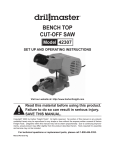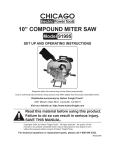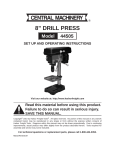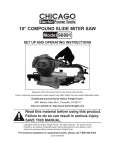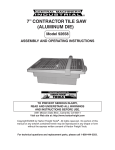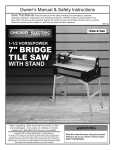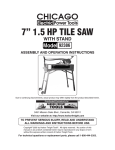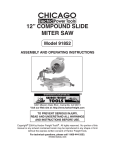Download CHICAGO 91995 Operating instructions
Transcript
10” COMPOUND MITER SAW 91995 Set up and Operating Instructions Distributed exclusively by Harbor Freight Tools®. 3491 Mission Oaks Blvd., Camarillo, CA 93011 Visit our website at: http://www.harborfreight.com Read this material before using this product. Failure to do so can result in serious injury. Save this manual. Copyright© 2004 by Harbor Freight Tools®. All rights reserved. No portion of this manual or any artwork contained herein may be reproduced in any shape or form without the express written consent of Harbor Freight Tools. Diagrams within this manual may not be drawn proportionally. Due to continuing improvements, actual product may differ slightly from the product described herein. Tools required for assembly and service may not be included. For technical questions or replacement parts, please call 1-800-444-3353. Manual Revised 07k, 09d NOTICE is used to address practices not related to personal injury. Save This Manual Keep this manual for the safety warnings and precautions, assembly, operating, inspection, maintenance and cleaning procedures. Write the product’s serial number in the back of the manual near the assembly diagram (or month and year of purchase if product has no number). Keep this manual and the receipt in a safe and dry place for future reference. CAUTION, without the safety alert symbol, is used to address practices not related to personal injury. General Tool Safety Warnings WARNING Read all safety warnings and instructions. Failure to follow the warnings and instructions may result in electric shock, fire and/or serious injury. Save all warnings and instructions for future reference. Important SAFETY Information In this manual, on the labeling, and all other information provided with this product: This is the safety alert symbol. It is used to alert you to potential personal injury hazards. Obey all safety messages that follow this symbol to avoid possible injury or death. DANGER indicates a hazardous situation which, if not avoided, will result in death or serious injury. WARNING indicates a hazardous situation which, if not avoided, could result in death or serious injury. 1. KEEP GUARDS IN PLACE and in working order. 2. REMOVE ADJUSTING KEYS AND WRENCHES. Form habit of checking to see that keys and adjusting wrenches are removed from tool before turning it on. 3. KEEP WORK AREA CLEAN. Cluttered areas and benches invite accidents. 4. DON’T USE IN DANGEROUS ENVIRONMENT. Don’t use power tools in damp or wet locations, or expose them to rain. Keep work area well lighted. 5. KEEP CHILDREN AWAY. All visitors should be kept safe distance from work area. 6. MAKE WORKSHOP KID PROOF with padlocks, master switches, or by removing starter keys. CAUTION, used with the safety alert symbol, indicates a hazardous situation which, if not avoided, could result in minor or moderate injury. SKU 91995 For technical questions, please call 1-800-444-3353. REV 09d Page 2 7. 8. DON’T FORCE TOOL. It will do the job better and safer at the rate for which it was designed. USE RIGHT TOOL. Don’t force tool or attachment to do a job for which it was not designed. RECOMMENDED MINIMUM WIRE GAUGE FOR EXTENSION CORDS (120 VOLT) NAMEPLATE AMPERES (at full load) EXTENSION CORD LENGTH 25’ 50’ 100’ 150’ 0–6 18 16 16 14 6.1 – 10 18 16 14 12 10.1 – 12 16 16 14 12 12.1 – 16 14 12 Do not use. TABLE A 9. USE PROPER EXTENSION CORD. Make sure your extension cord is in good condition. When using an extension cord, be sure to use one heavy enough to carry the current your product will draw. An undersized cord will cause a drop in line voltage resulting in loss of power and overheating. Table A shows the correct size to use depending on cord length and nameplate ampere rating. If in doubt, use the next heavier gauge. The smaller the gauge number, the heavier the cord. 10. WEAR PROPER APPAREL. Do not wear loose clothing, gloves, neckties, rings, bracelets, or other jewelry which may get caught in moving parts. Nonslip footwear is recommended. Wear protective hair covering to contain long hair. 11. ALWAYS USE SAFETY GLASSES. Also use face or dust mask if cutting operation is dusty. Everyday eyeSKU 91995 glasses only have impact resistant lenses, they are NOT safety glasses. 12. SECURE WORK. Use clamps or a vise to hold work when practical. It’s safer than using your hand and it frees both hands to operate tool. 13. DON’T OVERREACH. Keep proper footing and balance at all times. 14. MAINTAIN TOOLS WITH CARE. Keep tools sharp and clean for best and safest performance. Follow instructions for lubricating and changing accessories. 15. DISCONNECT TOOLS before servicing; when changing accessories, such as blades, bits, cutters, and the like. 16. REDUCE THE RISK OF UNINTENTIONAL STARTING. Make sure Trigger is in off position before plugging in. 17. USE RECOMMENDED ACCESSORIES. Consult the owner’s manual for recommended accessories. The use of improper accessories may cause risk of injury to persons. 18. NEVER STAND ON TOOL. Serious injury could occur if the tool is tipped or if the cutting tool is unintentionally contacted. 19. CHECK DAMAGED PARTS. Before further use of the tool, a guard or other part that is damaged should be carefully checked to determine that it will operate properly and perform its intended function – check for alignment of moving parts, binding of moving parts, breakage of parts, mounting, and any other conditions that may affect its operation. A guard For technical questions, please call 1-800-444-3353. REV 09d Page 3 or other part that is damaged should be properly repaired or replaced. conductor with insulation having an outer surface that is green with or without yellow stripes is the equipment-grounding conductor. If repair or replacement of the electric cord or plug is necessary, do not connect the equipment-grounding conductor to a live terminal. 20. DIRECTION OF FEED. Feed work into a blade or cutter against the direction of rotation of the blade or cutter only. 21. NEVER LEAVE TOOL RUNNING UNATTENDED. TURN POWER OFF. Don’t leave tool until it comes to a complete stop. 4. Check with a qualified electrician or service personnel if the grounding instructions are not completely understood, or if in doubt as to whether the tool is properly grounded. 5. Use only 3-wire extension cords that have 3-prong grounding plugs and 3-pole receptacles that accept the tool’s plug. 6. Repair or replace damaged or worn cord immediately. Grounding Instructions To prevent electric shock and death from incorrect grounding wire connection Read and follow these instructions: 110-120 V~ Grounded Tools: Tools with Three Prong Plugs 1. 2. 3. In the event of a malfunction or breakdown, grounding provides a path of least resistance for electric current to reduce the risk of electric shock. This tool is equipped with an electric cord having an equipmentgrounding conductor and a grounding plug. The plug must be plugged into a matching outlet that is properly installed and grounded in accordance with all local codes and ordinances. Do not modify the plug provided – if it will not fit the outlet, have the proper outlet installed by a qualified electrician. Improper connection of the equipment-grounding conductor can result in a risk of electric shock. The Grounding Pin 125 V~ 3-Prong Plug and Outlet (for up to 125 V~ and up to 15 A) 7. This tool is intended for use on a circuit that has an outlet that looks like the one illustrated above in 125 V~ 3-Prong Plug and Outlet. The tool has a grounding plug that looks like the plug illustrated above in 125 V~ 3-Prong Plug and Outlet. 8. The outlet must be properly installed and grounded in accordance with all codes and ordinances. REV 09d SKU 91995 For technical questions, please call 1-800-444-3353. Page 4 9. Do not use an adapter to connect this tool to a different outlet. Miter Saw Safety Warnings For Your Own Safety Read Instruction Manual Before Operating Miter Saw 1. Wear eye protection. 2. Keep hands out of path of saw blade. 3. Do not operate saw without guards in place. 4. Do not perform any operation freehand. 5. Never reach around saw blade. 6. Turn off tool and wait for saw blade to stop before moving workpiece or changing settings. 7. Disconnect power before changing blade or servicing. 8. To reduce risk of injury, return carriage to the full rear position after each crosscut operation. 9. Release lower guard retraction mechanism after each cut and before moving or removing the work piece. Blade adjustment is to be made with the power off and the blade stopped. 10. Return all guards to original position if any are moved during blade replacement. Check all guards for proper operation after service. 11. The lock down pin is to be used only to lock the head in place for carrying and storage. It is not to be used for any cutting operation. 12. Do not operate with ANY guard disabled, damaged, or removed. Moving guards SKU 91995 must move freely and close instantly. 13. Replacing the Saw Blade only with a new blade with a diameter of 10”, an RPM rating of at least 5,300, and a 5/8” arbor hole. 14. To avoid accidental injury, always wear heavy duty work gloves when changing Saw Blade. 15. Before use, make sure the Saw Blade is properly mounted on the Saw Spindle. Make sure the Saw Blade is balanced, and is not cracked or bent. 16. The Saw Blade will become hot while cutting. Allow the Saw Blade to completely cool before touching. 17. Make sure the workpiece is free from nails and any other foreign objects which can damage the Saw Blade. 18. The Cross Pin (28) should always be in the “locked down” position when the Saw is not being used and when the Saw is being transported. The Cross Pin should be activated in the “locked up” position when changing Saw Blades. NEVER use the Cross Pin in any cutting operation. The Cross Pin allows the operator to lock the Saw Blade in position, preventing the Saw Blade from being raised or lowered. 19. Allow the Saw Blade to spin up to full speed before feeding it into the workpiece. Do not force the Saw Blade into the workpiece when cutting. Apply moderate pressure, allowing the Saw Blade to cut without being forced. When turning off the Saw, allow the Saw Blade to spin down For technical questions, please call 1-800-444-3353. REV 09d Page 5 and stop on its own. Do not press against the Saw Blade to stop it. 20. Industrial applications must follow OSHA requirements. 21. Proper Miter Saw location: Make sure the Miter Saw is located on a flat, level, sturdy surface capable of supporting the weight of the Miter Saw, workpieces, and all other tools and accessories. 22. Never attempt to remove material stuck in the moving parts of the Miter Saw while the machine is plugged in and running. 23. The use of accessories or attachments not recommended by the manufacturer may result in a risk of injury to persons. 24. When servicing use only identical replacement parts. 25. Only use safety equipment that has been approved by an appropriate standards agency. Unapproved safety equipment may not provide adequate protection. Eye protection must be ANSI-approved and breathing protection must be NIOSH-approved for the specific hazards in the work area. 26. Industrial applications must follow OSHA guidelines. 27. Maintain labels and nameplates on the tool. These carry important safety information. If unreadable or missing, contact Harbor Freight Tools for a replacement. 28. Avoid unintentional starting. Prepare to begin work before turning on the tool. 29. People with pacemakers should consult their physician(s) before use. Electromagnetic fields in close proximity to heart pacemaker could cause pacemaker interference or pacemaker failure. 30. WARNING: Some dust created by power sanding, sawing, grinding, drilling, and other construction activities, contains chemicals known [to the State of California] to cause cancer, birth defects or other reproductive harm. Some examples of these chemicals are: • Lead from lead-based paints • Crystalline silica from bricks and cement or other masonry products • Arsenic and chromium from chemically treated lumber Your risk from these exposures varies, depending on how often you do this type of work. To reduce your exposure to these chemicals: work in a well ventilated area, and work with approved safety equipment, such as those dust masks that are specially designed to filter out microscopic particles. (California Health & Safety Code § 25249.5, et seq.) 31. WARNING: Handling the cord on this product will expose you to lead, a chemical known to the State of California to cause cancer, and birth defects or other reproductive harm. Wash hands after handling. (California Health & Safety Code § 25249.5, et seq.) 32. The warnings, precautions, and instructions discussed in this instruction manual cannot cover all possible conditions and situations that may occur. It must be understood by the operator that common sense and caution are REV 09d SKU 91995 For technical questions, please call 1-800-444-3353. Page 6 factors which cannot be built into this product, but must be supplied by the operator. Vibration Safety This tool vibrates during use. Repeated or long-term exposure to vibration may cause temporary or permanent physical injury, particularly to the hands, arms and shoulders. To reduce the risk of vibration-related injury: 1. Anyone using vibrating tools regularly or for an extended period should first be examined by a doctor and then have regular medical checkups to ensure medical problems are not being caused or worsened from use. Pregnant women or people who have impaired blood circulation to the hand, past hand injuries, nervous system disorders, diabetes, or Raynaud’s Disease should not use this tool. If you feel any medical or physical symptoms related to vibration (such as tingling, numbness, and white or blue fingers), seek medical advice as soon as possible. 2. Do not smoke during use. Nicotine reduces the blood supply to the hands and fingers, increasing the risk of vibration-related injury. 3. Wear suitable gloves to reduce the vibration effects on the user. 4. Use tools with the lowest vibration when there is a choice between different processes. 5. Include vibration-free periods each day of work. 6. Grip tool as lightly as possible (while still keeping safe control of it). Let the tool do the work. 7. To reduce vibration, maintain the tool as explained in this manual. If any abnormal vibration occurs, stop use immediately. Save these instructions. REV 09d SKU 91995 For technical questions, please call 1-800-444-3353. Page 7 SPECIFICATIONS Electrical Requirements Speed Saw Blade (Included) Arbor Size Crosscut Capacity Blade Tilt Capacity Positive Stops Overall Table Size COVER CASE (89) ARROW 120 V~ / 60 Hz / 15 A (Start) 5300 RPM (No Load) 10” Diameter / 60 Teeth 5/8” Diameter 4-11/16” x 2-15/16” @ 90° 4-11/16” x 1-9/16” @ 45° 0° - 45° Left 0°, 15°, 22.5°, 30°, 45° 18-1/8” W x 5-3/8” L x 3-1/8” H SAW TEETH POINTING DOWN SAW BLADE (56) ARROW E105017 UNPACKING When unpacking, check to make sure all the parts shown on the Parts List near then end of this manual are included. If any parts are missing or broken, please call Harbor Freight Tools at 1-800-444-3353 as soon as possible. ASSEMBLY INSTRUCTIONS FIGURE D 2. When installing a Saw Blade (56), make sure the teeth of the Saw Blade point downward, and that the direction of the arrow shown on the Saw Blade matches the direction of the arrow shown on the Cover Case (89). (See Figure D.) Note: For additional references to the parts listed in the following pages, refer to the Assembly Diagram near the end of this manual. To Install A Saw Blade WARNING! Prior to performing any assembly and/or adjustment procedures, make sure the Power Cord (102) of the Miter Saw is unplugged from its electrical outlet. Make sure the unit has completely cooled, and wear heavy-duty work gloves. 1. When replacing the Saw Blade (56), make sure the new Saw Blade has a diameter of 10”, an RPM rating of at least 5,300, and an arbor hole of 5/8” diameter. REV 07k, 09d SKU 91995 For technical questions, please call 1-800-444-3353. Page 8 3. Lock the Saw Blade (56) in its upward position. To do so, pull out on the Cross Pin (28). Raise and hold the Cover Case (89) of the Miter Saw fully upward. Turn the Cross Pin 90 degrees. Then, insert the Cross Pin into the deep slot in its locked position. (See Figure E.) SCREW (48) LARGE COVER (47) BOLT (50) SAFETY COVER (53) WRENCH (110) FIGURE G CROSS PIN (28) 5. Loosen the Screw (48) that holds the Large Cover (47) in place. Then, use the Wrench (110) to remove the Bolt (50). (See Figure G.) 6. Rotate the Large Cover (47) and Safety Cover (53) up and out of the way. (See Figure G.) FIGURE E 4. CAUTION! The Cross Pin (28) should always be activated in the “locked down” position when the Saw is not being used and when the Saw is being transported. The Cross Pin should be activated in the “locked up” position only when changing Saw Blades. NEVER use the Cross Pin in any cutting operation. The Cross Pin allows the operator to lock the Saw Blade in position, preventing the Saw Blade from being raised or lowered. (See Figure E.) SPINDLE LOCK (84) FIGURE H 7. Depress the Spindle Lock (84) to keep the Saw Blade (56) from turning. (See Figure H.) Rev 07k SKU 91995 For technical questions, please call 1-800-444-3353. Page 9 CAUTION! Make sure to pull out on the Cross Pin (28). Turn the Cross Pin 90 degrees. Then, insert the Cross Pin into the shallow slot in its unlocked position. NEVER use the Cross Pin in any cutting operation. (See Figure E.) SPINDLE BOLT (58) OUTER FLANGE (57) CLOCKWISE TO LOOSEN COUNTERCLOCKWISE TO TIGHTEN To Assemble Additional Accessories FIGURE I 8. Use the Wrench (110) to unscrew and remove the Spindle Bolt (58) clockwise. CLAMP ASSEMBLY (36) NOTE: The Spindle Bolt unscrews in a clockwise direction. Then, remove the Outer Flange (57). (See Figure I.) 9. Release pressure on the Spindle Lock (84). (See Figure H.) 10. Wearing heavy duty work gloves to avoid accidental cuts, remove the old Saw Blade (56). 11. Install the new Saw Blade (56), making sure the teeth of the Saw Blade are pointing downward. (See Figure D.) THUMB SCREW (35) GUIDE FENCE (37a) THUMB SCREW (10) HOLDER (9) FIGURE K 1. A workpiece Clamp Assembly (36) can be installed by inserting the Assembly into the hole located in the Guide Fence (37a). Once inserted, lock the Assembly in place with the Thumb Screw (35). To clamp the workpiece to the Base (8a) of the Miter Saw, turn the Adjusting Knob on the Clamp Assembly clockwise. (See Figure K.) 2. A workpiece Holder (9) can be inserted into each side of the Base (8a), adjusted for the desired length, and locked in place with the Thumb Screw (10). The Holders should be used as supports when cutting longer length workpieces. (See Figure K.) 12. Reassemble the Outer Flange (57), and Spindle Bolt (58) firmly. (See Figure I.) 13. Swing the Large Cover (47) and Safety Cover (53) back in place, making sure the Safety Cover covers the Saw Blade (56). (See Figure G.) 14. Reinstall the Bolt (50), and retighten the Screw (48). (See Figure G.) 15. Make sure the Safety Cover (53) returns to its original position prior to operating the Miter Saw. SKU 91995 BASE (8a) For technical questions, please call 1-800-444-3353. Page 10 The Safety Cover 1. The transparent Safety Cover (53) automatically rotates to cover the Saw Blade (56) when the Cover Case (89) is lifted. When the Cover Case is lowered, the Safety Cover rotates back out of the way. 2. Do not disconnect or remove the Safety Cover (53). Do not operate the Miter Saw if the Safety Cover is damaged or missing. 3. If the transparent Safety Cover (53) becomes so dirty that the Saw Blade (56) cannot be seen clearly, disconnect the electrical Power Cord from its electrical outlet and clean the Safety Cover with a soft, damp, cloth. A mild detergent may be used, but do not use solvents which may damage the Safety Cover. The Trigger Before plugging in the Miter Saw, check the operation of the Trigger (98). Do not operate the Miter Saw if the Trigger is not operating properly. To turn on the Miter Saw, simply squeeze the Trigger. To turn off the tool, release pressure on the Trigger. SKU 91995 The Dust Bag DUST TUBE (94) DUST BAG (93) FIGURE N 1. The Dust Bag (93) catches and holds the wood chips and saw dust when the Miter Saw is in operation. (See Figure N.) 2. The outside diameter of the Dust Tube (94) is 1-3/4” to which the Dust Bag (93) or a vacuum hose (not included) may be attached. It is recommended that only a qualified technician perform this procedure. (See Figure N.) For technical questions, please call 1-800-444-3353. Page 11 contact the bottom of the Table (18a) or any other part of the Saw Base (8a). (See Figure O.) To Adjust The Cutting Depth WARNING! Prior to performing this procedure, make sure the Power Cord (102) of the Miter Saw is unplugged from its electrical outlet. 1. 5. The depth of cut may be adjusted to a maximum of 4-11/16” at 90°, and 4-11/16” at 45°. TABLE (18a) SCREW (92) BASE (8a) HANDLE (1a) FIGURE O 2. Slightly loosen the Screw (92) and pull the Miter Saw’s Cover Case (89) downward as far as it will go. Observe whether the edge of the Saw Blade (56) passes completely through the Kerf Board (11a). (See Figure O.) 3. If the Saw Blade (56) does not pass completely through the Kerf Board (11a), lower the Saw Blade further by loosening the Screw (92). (See Figure O.) 4. After adjusting the Screw (92), press down on the Miter Saw and make sure the Saw Blade (56) does not SKU 91995 To Adjust The Miter Angle WARNING! Prior to performing this procedure, make sure the Power Cord (102) of the Miter Saw is unplugged from its electrical outlet. 1. The miter angle of a cut may be adjusted 0 - 45° to the right or left. To do so, loosen the Handle (1a) located at the front of the Table (18a). (See Figure O.) 2. Move the Handle (1a) to the right or left until the desired miter angle of cut is indicated by the Gauge located on the Base (8a). Then, tighten the Handle (1a) to lock the Miter Angle in place. (See Figure O.) KERF BOARD (11a) GAUGE If the Saw Blade (56) touches the Table (18a) or any other part of the Saw Base (8a), tighten the Screw (92) to raise the Saw Blade slightly until it clears. (See Figure O.) For technical questions, please call 1-800-444-3353. Page 12 To Adjust The Bevel Of Cut WARNING! Prior to performing this procedure, make sure the Power Cord (102) of the Miter Saw is unplugged from its electrical outlet. FIGURE P HANDLE GAUGE (24) (30) BACK RACK (25) 1. The bevel angle (or Saw Blade tilt capacity) may be adjusted from 0 45° to the left. To do so, loosen the Handle (30) located at the rear of the Miter Saw. (See Figure P.) 2. Tilt the Back Rack (25) until the desired bevel angle of cut is achieved as indicated on the Gauge (24). Then, re-tighten the Handle (30) to lock the Back Rack in place. (See Figure P.) SKU 91995 For technical questions, please call 1-800-444-3353. Page 13 Basic Operation WARNING! Make sure the Power Cord (102) of the Miter Saw is unplugged from its electrical outlet. Then, if necessary, make adjustments to the workpiece Holder (9), cutting depth, miter angle, and bevel angle. 1. Raise the Saw Blade (56) up to allow positioning of the workpiece. 2. Check to make sure the Trigger (98) is operating properly. 3. Place the workpiece on the Table (18a) and against the Guide Fence (37a). 4. Use the Clamp Assembly (36) to hold the workpiece in place. 5. Plug the Power Cord (102) into the nearest 120 volt, grounded, electrical outlet. 6. Squeeze the Trigger (98) to turn on the Miter Saw. 7. When the Saw Blade (56) is turning at full speed, slowly bring down the Motor Housing (75) to complete the cut. 10. Turn off the Miter Saw if the workpiece is to be backed out of an uncompleted cut. 11. When the cut is complete, release the Trigger (98) to turn off the Miter Saw. 12. Wait until the Saw Blade (56) comes to a complete stop. Raise the Motor Housing (75). Then, unplug the Power Cord (102) from its electrical outlet. 13. Loosen the Clamp Assembly (36), and remove the workpiece and scrap material from the Table (18a). Note: Feed the Saw Blade into the workpiece gradually. Do not force the machine to remove material faster than it was designed to cut. 8. When cutting a large workpiece, make sure its entire length is properly supported. If necessary, use a roller stand (not included) with a larger workpiece. 9. Never attempt to remove material stuck in the moving parts of the Miter Saw while it is plugged in and running. SKU 91995 For technical questions, please call 1-800-444-3353. Page 14 INSPECTION, MAINTENANCE, AND CLEANING WARNING! Always make sure the Trigger (98) is in its “OFF” position, and unplug the Power Cord (102) from its 120 volt electrical outlet before performing any inspection, adjustments, maintenance, or cleaning. Make sure the power tool is cool to the touch before inspection, maintenance, and cleaning begin. Always protect your hands by wearing work gloves. 1. 2. Before each use, inspect the general condition of the Miter Saw. Check for loose screws, misalignment or binding of moving parts, cracked or broken parts, damaged electrical wiring, loose, cracked, or bent Saw Blade (56), and any other condition that may affect its safe operation. If abnormal noise or vibration occurs, have the problem corrected before further use. Do not use damaged equipment. Never work with a dull saw blade. Daily: With a soft brush, cloth, or vacuum, remove all dust and debris from the Miter Saw. Then, use a premium quality, lightweight machine oil to lubricate all moving parts except the Saw Blade (56). FIGURE Q BRUSH COVER (72) (NOT SHOWN) BRUSH COVER (72) 3. To replace the Motor Carbon Brushes: It may become necessary at sometime to replace the two Carbon Brushes (73) when the Motor performance decreases, or stops working completely. The Carbon Brushes are located on each side of the Motor Housing (75), see Figure Q. To replace the brushes: a.Remove the two Brush Covers (72). Then, remove the two Carbon Brushes from the Brush Holders (74). b.If the Carbon Brushes are worn down more than 1/2, replace both Carbon Brushes. If, however, the Carbon Brushes are just dirty they may be cleaned by rubbing them with a pencil eraser. c. When installing the Carbon Brushes, make sure the carbon portion of the Carbon Brushes contact the Motor Armature, and that the springs face away from the Motor. Also, make sure the springs operate freely. d.Replace the Brush Holders. NOTE: New Carbon Brushes tend to arc or spark when first used until they wear and conform to the Motor’s Armature. SKU 91995 For technical questions, please call 1-800-444-3353. Page 15 WARNING! All other maintenance and servicing should be performed only by a qualified service technician. PLEASE READ THE FOLLOWING CAREFULLY THE MANUFACTURER AND/OR DISTRIBUTOR HAS PROVIDED THE PARTS LIST AND ASSEMBLY DIAGRAM IN THIS MANUAL AS A REFERENCE TOOL ONLY. NEITHER THE MANUFACTURER OR DISTRIBUTOR MAKES ANY REPRESENTATION OR WARRANTY OF ANY KIND TO THE BUYER THAT HE OR SHE IS QUALIFIED TO MAKE ANY REPAIRS TO THE PRODUCT, OR THAT HE OR SHE IS QUALIFIED TO REPLACE ANY PARTS OF THE PRODUCT. IN FACT, THE MANUFACTURER AND/OR DISTRIBUTOR EXPRESSLY STATES THAT ALL REPAIRS AND PARTS REPLACEMENTS SHOULD BE UNDERTAKEN BY CERTIFIED AND LICENSED TECHNICIANS, AND NOT BY THE BUYER. THE BUYER ASSUMES ALL RISK AND LIABILITY ARISING OUT OF HIS OR HER REPAIRS TO THE ORIGINAL PRODUCT OR REPLACEMENT PARTS THERETO, OR ARISING OUT OF HIS OR HER INSTALLATION OF REPLACEMENT PARTS THERETO. SKU 91995 For technical questions, please call 1-800-444-3353. Page 16 PARTS LIST Part 1a 7 8a 9 10 11a 12 14 15 16 17 18a 19 20 21 22 23 24 25 26 28 29 30 31 32 33 34 35 36 37a 38 39 40 41 42 43 44 45 46 47 Description Handle Screw Base Holder Thumb Screw Kerf Board Screw Nut Pointer Spring Screw Table Nut Screw Gasket Spring Gasket Screw Gauge Back Rack Nut Cross Pin Screw Handle Screw Spring Spring Base Small Base Thumb Screw Clamp Assembly Guide Fence Connecting Bar Screw Gasket Gasket Gasket Gasket Screw Nut Small Cover Large Cover Part 48 49 50 51 52 53 54 55 56 57 58 59 60 61 62 63 64 65 66 67 68 69 70 71 72 73 74 75 76 77 78 79 80 81 82 83 84 85 86 87 Description Screw Spring Bolt Gasket Screw Safety Cover Spring Gasket Screw Saw Blade Outer Flange Spindle Bolt Inner Flange Pin Arbor Bearing Bearing Box Gear Blind Ring Needle Bearing Spring Spring Cover Screw Screw Spring Gasket Carbon Brush Cover Carbon Brush Carbon Brush Holder Motor Housing Screw Spring Gasket Gasket Stator Windshield Ring Bearing Armature Bearing Spindle Lock Middle Cover Screw Fixed Rod Part 88 89 90 91 92 93 94 95 96 97 98 99 100 101 102 103 104 105 106 107 108 109 110 111 112 113 114 115 116 117 118 119 120 121 122 123 124 125 Description Screw Cover Case Screw Rubber Gasket Screw Dust Bag Dust Tube Hanging Ring Screw Switch Gasket Trigger Rubber Buff Handle (Lower) Sheathing Power Cord Wire Holding Board Screw Handle (Upper) Screw Nut Screw Plate Wrench (Not Shown) Screw Bracket Angle Spring Spring Washer Screw Rubber Stopper Screw Pointer Screw Spring Steel Ball Washer Spring Roll Pin Lock Nut Note: Some parts are listed and shown for illustration purposes only, and are not available individually as replacement parts. REV 08h, 09d SKU 91995 For technical questions, please call 1-800-444-3353. Page 17 ASSEMBLY DIAGRAM 81 80 74 75 72 110: WRENCH NOT SHOWN. 113 Note: Some parts are listed and shown for illustration purposes only, and are not available individually as replacement parts. REV 08h, 09d SKU 91995 For technical questions, please call 1-800-444-3353. Page 18 LIMITED 90 DAY WARRANTY Harbor Freight Tools Co. makes every effort to assure that its products meet high quality and durability standards, and warrants to the original purchaser that this product is free from defects in materials and workmanship for the period of 90 days from the date of purchase. This warranty does not apply to damage due directly or indirectly, to misuse, abuse, negligence or accidents, repairs or alterations outside our facilities, criminal activity, improper installation, normal wear and tear, or to lack of maintenance. We shall in no event be liable for death, injuries to persons or property, or for incidental, contingent, special or consequential damages arising from the use of our product. Some states do not allow the exclusion or limitation of incidental or consequential damages, so the above limitation of exclusion may not apply to you. This warranty is expressly in lieu of all other warranties, express or implied, including the warranties of merchantability and fitness. To take advantage of this warranty, the product or part must be returned to us with transportation charges prepaid. Proof of purchase date and an explanation of the complaint must accompany the merchandise. If our inspection verifies the defect, we will either repair or replace the product at our election or we may elect to refund the purchase price if we cannot readily and quickly provide you with a replacement. We will return repaired products at our expense, but if we determine there is no defect, or that the defect resulted from causes not within the scope of our warranty, then you must bear the cost of returning the product. This warranty gives you specific legal rights and you may also have other rights which vary from state to state. 3491 Mission Oaks Blvd. • PO Box 6009 • Camarillo, CA 93011 • (800) 444-3353 REV 09d SKU 91995 For technical questions, please call 1-800-444-3353. Page 19




















